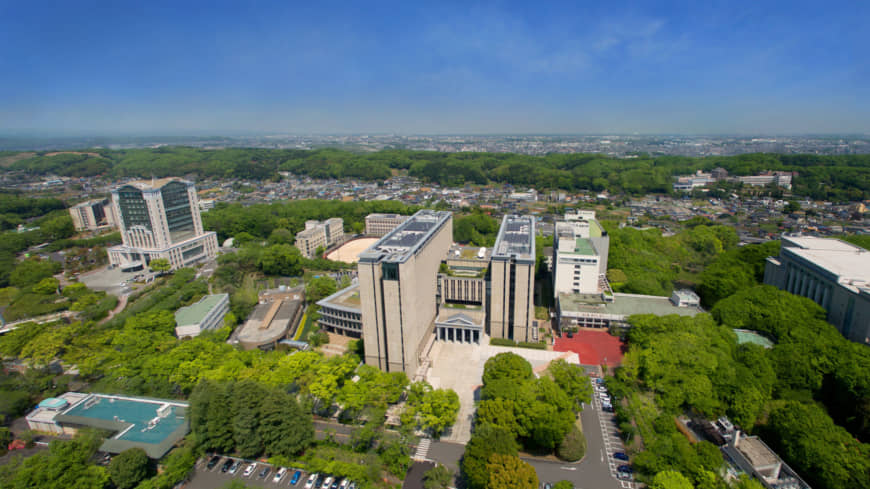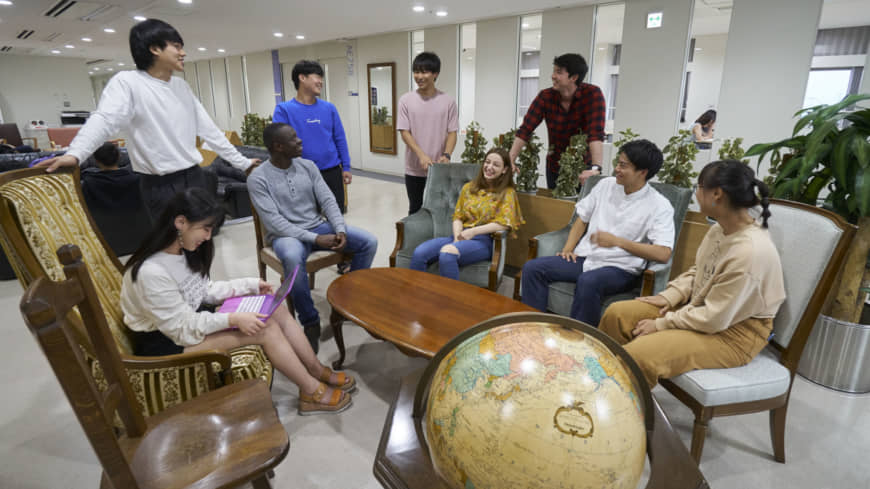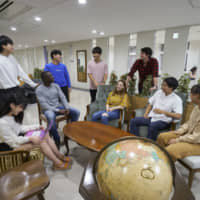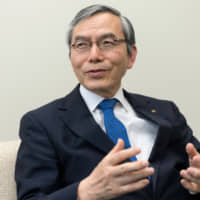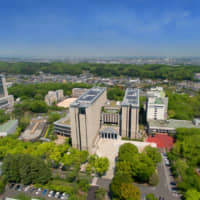Within the verdant grounds of the Soka University Campus, there are two unmissable bronze statues.
Beneath one, a plaque asks: “For what purpose should one cultivate wisdom? May you always ask yourselves this question,” while the other reads, “Only labor and devotion to one’s mission in life gives life its worth.”
Since its founding in western Tokyo’s Hachioji in 1971, Soka University has sought to instill among its students not just a sense of studiousness and industriousness, but also asks them to continually ponder ways in which those two qualities can be applied for the betterment of humankind.
Founding philosophy
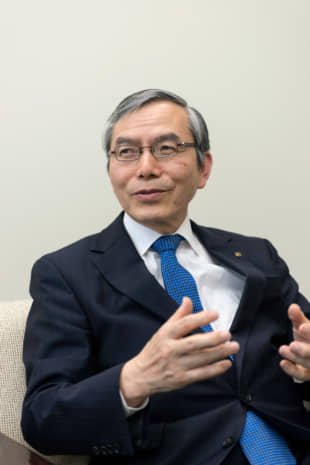
“The university was founded on three principles — Be the highest seat of learning for humanistic education; Be the cradle of a new culture; and Be a fortress for the peace of humankind,” said Yoshihisa Baba, president of Soka University and a professor of econometrics. He added that these principles remain at the heart of the university’s philosophy, even as it continues to evolve.
To elaborate, the first of the three principles defines the university’s humanistic approach to education. University education should not be limited to the teaching and acquisition of specialized knowledge. Soka University strives to provide humanistic education that will foster individuals who are able to freely employ knowledge in order to bring forth the wisdom that is rooted in rich humanity, to creatively confront the challenges of humankind.
The second reflects the key role of taking the lead in the new culture, an integrating philosophy that embraces and brings order to the diversity of human susceptibilities, culture, reason and learning. In order to establish a global culture, the university aims to foster individuals with passion, enriched by learning, who creatively take the lead in each field. With the solidarity of these individuals, Soka University aims to be a cradle for the creation of a global culture based on the solidarity of global citizens — a solidarity of creative humanity.
The final principle upholds the philosophy of peace for all humankind. Without peace, there is no construction of a new culture nor the development of the future. In what way to protect peace is the greatest challenge of humanity. For the realization of this, university founder Daisaku Ikeda has conducted many dialogues with intellectuals worldwide and opened paths of exchanges between humankind. Soka University inherits this spirit, to develop open dialogue with people around the world and aims to become a fortress to protect the happiness and peace of humankind.
“Ikeda not only advocated these founding principles, but also contributed to society through value-creation, which is the main mission of Soka University and he encouraged students to become creative individuals,” said Baba. Ikeda spoke of the importance of “global citizens,” who are capable of value-creation on a global scale, during a lecture titled “Thoughts on Education for a Global Citizenship” at Teacher’s College, Columbia University in 1996.
He said the following three principles are the essential elements of global citizenship: 1) The wisdom to perceive the interconnectedness of all life and living; 2) The courage not to fear or deny difference, but to respect and strive to understand people of different cultures, and to grow from encounters with them; 3) The compassion to maintain an imaginative empathy that reaches beyond one’s immediate surroundings and extends to those suffering in distant places.
Soka University strives to foster “creative global citizens” with wisdom, courage, and compassion, which are rooted in the founding philosophy, through promoting education and research in various fields.
Fostering global citizens
In its quest to cultivate global citizens, Soka University now comprises eight undergraduate faculties, five graduate school programs, and two professional graduate school programs. With around 7,700 students enrolled, the university has exchange programs with 214 universities across 61 countries and regions.
Roughly 60 percent of Japanese students at Soka University study overseas and the university hosts around 730 international students annually. The newly opened international dorms, where both Japanese and international students live together, provide a comfortable setting for cross-cultural exchanges.
“The dorms and halls of the university have grown to be an international environment where different languages and ways of seeing the world cross over. … It’s a valuable introduction to what they will face when they step out into the wider world,” Baba said.
Efforts to create a globalized campus for students were recognized when Soka University was selected for Japan’s Top Global University Project by the Ministry of Education, Culture, Sport, Science and Technology in 2014.
In this vein, the university continues to excel as a leader in the globalization of Japan’s education, receiving the highest evaluation of “S” in its latest mid-term evaluation.
With the theme of “Global Initiative for Humanistic Education — Fostering Global Citizens for Building Peace and Sustainable Prosperity,” the university has been fostering creative global citizens that can contribute to the development of society, Baba explained.
One of the notable initiatives is the increase of English Medium Programs (EMPs), which is a general term for courses in which students can earn a degree by only using English, in undergraduate and graduate studies. The university currently offers 11 courses including the Faculty of Business Administration, International Liberal Arts, and Graduate School of Engineering.
The university has also established overseas offices in Beijing, Bangkok, Seoul, and Caloocan in the Philippines, thereby strengthening its connections throughout Asia.
Soka University is also engaged in various international activities including a research project aimed at establishing a sustainable recycling society in Ethiopia.
Owing to these efforts, this year, the university was ranked in 101st to 200th place (overall) in the Times Higher Education University Impact Rankings in the world for its engagements in the United Nation’s Sustainable Development Goals (SDGs).
Furthermore, the university was ranked 61st for SDG 16 — Peace, Justice and Strong Institutions.
International careers
On an individual level, students and alumni are also making their mark on the global stage. In the World Robot Challenge 2018 at Tokyo Big Site, Soka University placed second in the Partner Robot Challenge (Virtual Space)” category themed around humans and robots working together.
In the realm of sports, students continued a winning streak in the International Cheer Union’s 2019 World Cheerleading Championships with their fourth consecutive victory in the category of Hip-hop Doubles.
The G(irls) 20 Global Summit Argentina 2018 also marked the fourth time in a row that a Soka University student has represented Japan.
These experiences during their student years lead many alumni to thrive in their careers. “Through work, I visit many different countries and without fail there are Soka alumni giving it their best in their careers,” Baba said, adding they can be found anywhere all over the world, even in countries such as Uzbekistan, the Czech Republic and Kenya.
Many of them are involved in activities that directly benefit society; one graduate, for example, has worked for the United Nations High Commissioner for Refugees (UNHCR) since 1993 and was a director of its offices in Bangladesh when some 650,000 Rohingya refugees arrived there in 2017.
Some international alumni sometimes find themselves returning to Japan as diplomats. Two notable figures are Russian Ambassador H.E. Mikhail Galuzin and former Chinese Ambassador H.E. Cheng Yonghua.
Through its many programs and efforts, Soka University remains steadfast in its commitment to its founding principles and the contribution to the happiness and peace of the people in today’s ever-evolving society.
| Degree courses | |
|---|---|
| Faculties | Graduate schools |
| Faculty of Economics | Graduate School of Economics |
| Faculty of Business Administration | Graduate School of Law |
| Faculty of Law | Graduate School of Letters |
| Faculty of Letters | Graduate School of International Peace Studies |
| Faculty of Education | Graduate School of Engineering |
| Faculty of Science and Engineering | Professional graduate schools |
| Faculty of Nursing | Law School |
| Faculty of International Liberal Arts | Graduate School of Teacher Education |
Soka University
Address: 1-236 Tangi-machi,
Hachioji-shi, Tokyo, 192-8577 Japan
Tel: 042-691-2211
E-mail: [email protected]
URL: https://www.soka.ac.jp/en/



